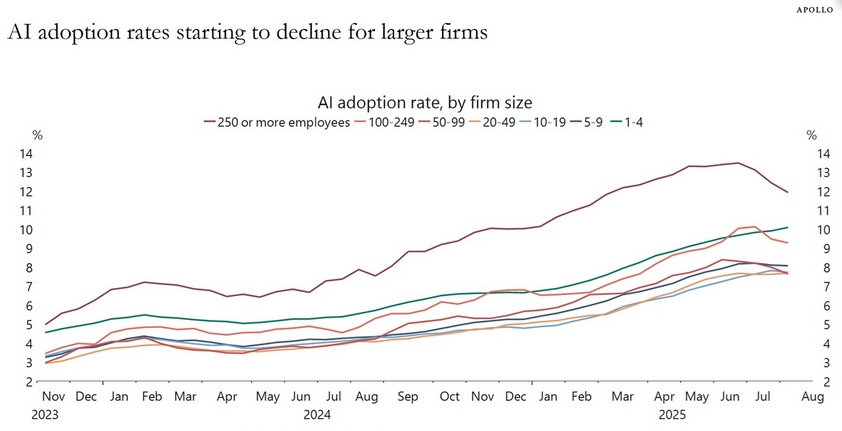Goldman & Apollo Poke the AI Bubble: AI Adoption Rate May Have Peaked, Following MIT’s “Zero Return” Report
TradingKey - As markets still grapple with the fallout from a late-August MIT report that dented tech stocks, the AI bubble narrative appears to be gaining fresh support — this time from two major institutional reports: Goldman Sachs points to slowing AI adoption growth, while Apollo finds that AI adoption among large U.S. firms has actually declined.
According to a report released on September 7 by Apollo, AI adoption among U.S. large enterprises — defined as companies with 250 or more employees — peaked mid-year and has since declined for several months.

Source: Apollo
This data is based on a biweekly survey by the U.S. Census Bureau of 1.2 million companies, which asks whether firms used AI tools — such as machine learning, natural language processing, virtual agents, or speech recognition — during the period to help produce goods or services.
In a report released on Monday, Goldman Sachs found that the share of U.S. companies using AI rose from 9.2% in Q2 to 9.7% in Q3 2025 — a clear slowdown in growth.
In a report last Thursday, Goldman noted that 58% of S&P 500 companies mentioned AI on earnings calls — a record high. While these firms touted AI applications in customer service, software coding, and marketing, few provided concrete data on AI’s impact on earnings.
Goldman emphasized that despite AI-related stocks rising 32% year-to-date — following a 17% gain in 2024 — this hype has not translated into profits.
A recent McKinsey survey echoed this disconnect between investment and returns: over 80% of companies said generative AI has not significantly impacted profits.
Goldman argues that the U.S. is still in the early stages of AI adoption, with larger firms — especially in information and finance — leading the way. But the risk is that hype is far ahead of reality.
The bank warned that if AI spending reverts to 2022 levels, AI-driven sales forecasts could fall by $1 trillion, and the S&P 500’s market cap could drop by 15% to 20%.
The late-August MIT “AI Divide” report found that 95% of generative AI investments have yielded zero financial return, half of all AI projects fail, only 40% of firms deploy AI in practice, and just 5% of pilots transition to full production.
That report — combined with OpenAI CEO Sam Altman’s comments on AI over-enthusiasm — reignited “AI bubble” fears, sending Palantir down over 9% and Nvidia down 3.5%, with broader tech stocks weakening.
Experts say tech stocks had reached irrational levels of speculation, and they are now facing a reality check.



